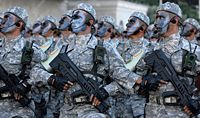Soldier
| Common military ranks | ||
|---|---|---|
| Officers | ||
| Navies1 | Armies and Air Forces |
Air Forces1 |
| Admiral of the Fleet |
Field Marshal | Marshal of the Air Force |
| Admiral | General | Air Marshal |
| Commodore | Brigadier | Air Commodore |
| Captain | Colonel | Group Captain |
| Commander | Lt. Colonel | Wing Commander |
| Lt. Commander | Major | Squadron Leader |
| Lieutenant | Captain | Flight Lieutenant |
| Sub-Lieutenant | Lieutenant | Flying Officer |
| Seamen, soldiers and airmen | ||
| Warrant Officer | Sergeant Major | Warrant Officer |
| Petty Officer | Sergeant | Sergeant |
| Leading Rate | Corporal | Corporal |
| Seaman | Private | Aircraftman |
| 1 in the Commonwealth
|
||
| Soldier | |
|---|---|
 German Army soldiers in Bosnia |
|
| Occupation | |
| Type | Profession |
| Activity sectors | Military |
| Description | |
| Competencies | Physical abilities, stamina, mindset |
| Fields of employment | Army |
| Related jobs | Commando, SWAT, policeman, mercenary |
A soldier is a general English term that refers to a land component of national armed forces. In most societies of the world, "soldier" is also a general term for any member of the land forces including commissioned or non-commissioned officers.
Contents |
Etymology
The word soldier is derived from an Old French word, itself a derivation of Solidarius, Latin for someone who served in the armed forces for pay, as opposed to warriors in tribal society where every grown man is automatically a member of his clan's fighting force. Solidare in Latin means "to pay"; Roman soldiers were paid in solidi, so-called because they were a new type of solid silver coin brought in after a reform of the Roman monetary system.
Non-English equivalents
The common Romance origin for the words soldier and payment survives not only in French as soldat and solde, but also in other languages, like German Soldat and Sold, Spanish soldado and sueldo, Portuguese soldado and soldo, Dutch soldaat and soldij, Italian "soldato" and "soldo", Arabic "Gondi" and "moganad" and many other languages.
In the Russian language the word soldier is also "солдат" ("soldat"), although it is not related to the Russian word for money, but was borrowed from German use. In some languages the word soldier is derived from different etymology, for example Estonian "sõdur" is derived from word "sõda," which means "war." And Finnish "sotilas" or "soturi", and "sota" meaning "war".
Occupational specialities

In most armed forces the word soldier has been mostly abandoned with increasing specialisation in military occupations that require different areas of knowledge and skill-sets, and have been replaced by names which reflect Arm, Service or Branch of individual's service, type of unit or operational employment or technical use such as: trooper, tanker, Commando, dragoon, infantryman, marine, paratrooper, ranger, sniper, engineer, sapper, or a gunner.
Other terms
In some English speaking countries soldiers serving in specific occupations are referred to by terms other than their occupational name. For example military police personnel in the U.K. are known as "redheads" from the colour of their berets. In the United States Army, infantrymen are called "grunts", while artillerymen are sometimes referred to as "redlegs", from the branch color for artillery. In the UK Artillery men are known as "drop shorts" due to their propensity for dropping rounds short of the intended target and usually with disastrous results onto their own sides infantry troops.
See also
- Army
- Related terms: Mercenary, Guerrilla, Militant, Combatant
- Military use of children